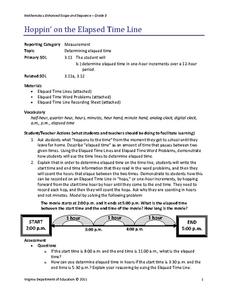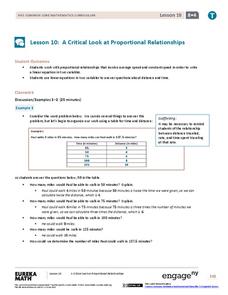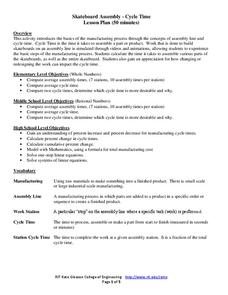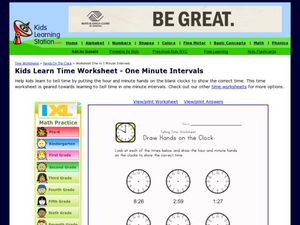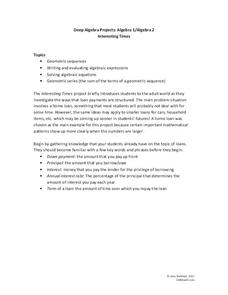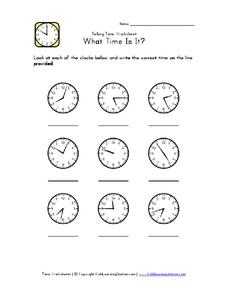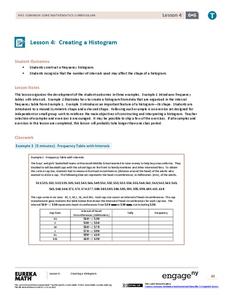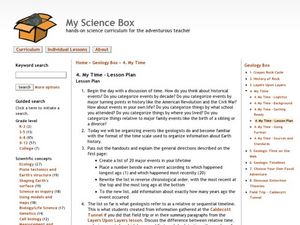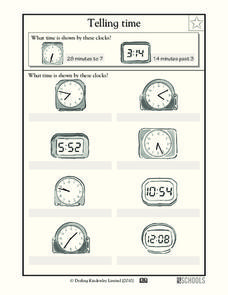Virginia Department of Education
Hoppin' on the Elapsed Time Line
Time flies when you're teaching math! Okay, maybe not for everyone, but this lesson will have your young mathematicians calculating elapsed time before you know it.
PBS
Math with Jake: Frequencies and Pitch
Be an octave above the rest. A musician explains how to write music in different time signatures. An interesting resource continues to demonstrate ratios using the pitch of musical notes and hertz. Pupils use a pitch table and determine...
Curated OER
Telling Time
In this telling time learning exercise, students review analog clocks. Students use the time given and an analog clock to draw the hands on the clock face to represent the time given. There are seven in all.
The Digits
Telling Time: The Digits
Time to teach your students how to read a clock? This resource is here to help! Engaging young mathematicians with two fun videos and a series of hands-on activities, these lessons offer a multimedia approach to teaching this important...
EngageNY
A Critical Look at Proportional Relationships
Use proportions to determine the travel distance in a given amount of time. The 10th installment in a series of 33 uses tables and descriptions to determine a person's constant speed. Using the constant speed, pupils write a linear...
Curated OER
Worksheet 3: Graphing Speed and Time
In this graphing speed and time worksheet, students answer 7 questions regarding graphing, speed, distance, derivatives, Newton's method and wheel radius.
Rochester Institute of Technology
Skateboard Assembly - Cycle Time
Assemble a great lesson on assembly lines. In the first installment of a nine-part technology/engineering series, future entrepreneurs learn about the manufacturing process, specifically about the assembly line and cycle time. The lesson...
Curated OER
Kids Learn Time Worksheet - One Minute Intervals
In this telling time in one minute intervals worksheet, students look at 9 clocks, observe the time stated underneath each clock and then draw the hour and minute hands on the clocks to show the correct time.
Houghton Mifflin Harcourt
Unit 3 Math Vocabulary Cards (Grade 5)
Fifty-four flashcards make up a set to help reinforce math vocabulary. The set offers two types of cards; a word card printed in bold font, and a definition card equipped with an example and labels. Terms include capacity,...
5280 Math
Interesting Times
Gain a little interest in functions with a real-life task. Young scholars analyze home loan data with a geometric sequence and series. They use the models to make predictions about the total loan payments at certain intervals in a...
Curated OER
Telling Time With Clocks/Bingo “Time”
Young learners create a clock by adding hands and placing the numbers in the correct location. After each learner has their very own clock, they explore each component. Review on the hour times, and then introduce them to five-minute...
Curated OER
What Time Is It? Nearest Minute
In this telling time worksheet, students study 9 clocks and determine the time to the nearest minute. Students write the correct time under each clock.
Curated OER
Telling Time to the Nearest Minute
For this telling time worksheet, students study each of 9 clocks and determine the time. Students write the correct time on the line provided.
Curated OER
What Time Is It?
Are your learners practicing telling time? They use the nine clocks provided and write the corresponding time for each clock. If you're looking to extend this activity, have them tell a partner what they'd be doing at each time.
Curated OER
Telling Time for Grade 3
Ten questions are provided to review elapsed time. Your third graders will like that some questions provide visual representations to guide learners. Use Internet Explorer if you want this worksheet to print in its proper format.
Curated OER
Telling Time as an Everyday Use of Numbers
How can we estimate time? Have your young mathematicians make a clock. Then they compare and contrast types of clocks. They practice writing times in two different ways and make a book about telling time.
Curated OER
It's About Time
First, second, and third graders explore elapsed time through estimation and prediction. They work with a partner to estimate how long it will take to perform various tasks. One person uses a stop watch to time his or her partner...
EngageNY
Creating a Histogram
Display data over a larger interval. The fourth segment in a 22-part unit introduces histograms and plotting data within intervals to the class. Pupils create frequency tables with predefined intervals to build histograms. They describe...
Curated OER
My Time!
Learners explore how to tell time by looking at their daily schedule. Everyone's days start out the same (with school), but what does each learner do after school? How do they spend their time?
Curated OER
Telling Time
Tick tock! Test your third graders' time skills by providing both analog and digital clocks for pupils to decipher. Most of the times are between five minute intervals, prompting your class to really interpret each stroke of the clock....
Curated OER
Time to Cook!
Don't let the cupcakes burn! Using cooking procedure, learners practice drawing minute and hour hands onto five analog clock faces. They read five scenarios which require them to add time increments to find the time required for each...
Curated OER
Telling Time By 5 Minute Increments
Young learners practice telling time from analog clock illustrations. There are nine illustrations here, all illustrating increments of five. You could use this worksheet for practice or a short quiz.
Curated OER
Telling Time: Free Version
In this telling time worksheet, students solve 9 problems in which the time on an analog clock is analyzed. Students write the time in numbers under each clock. All times are to the nearest 5 minutes.
Bowland
Fish Dish
Minimize the time it takes to create a fish dish. Scholars use their knowledge of time to devise an order that accounts for different constraints. Considering jobs that can be done in parallel is essential to solving the problem.
